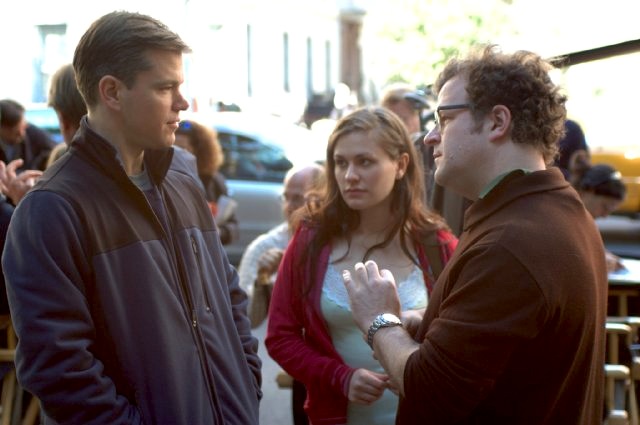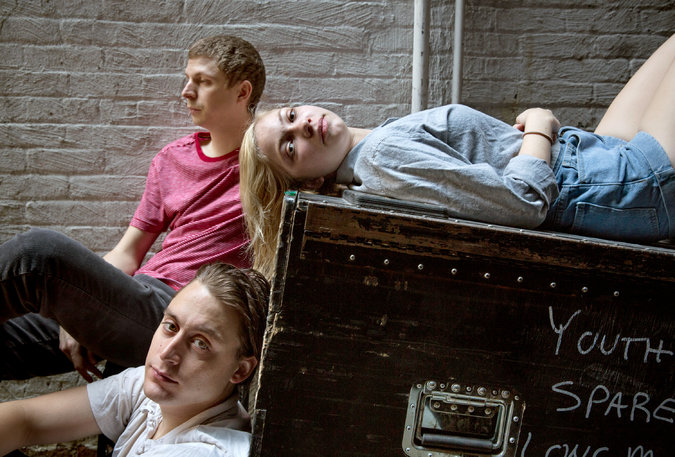Stage Door: This is Our Youth
 Friday, September 12, 2014 at 8:00PM
Friday, September 12, 2014 at 8:00PM  Here's Matthew Eng on a theatrical revival in NYC of interest to movie fans...
Here's Matthew Eng on a theatrical revival in NYC of interest to movie fans...
There’s always a bit of wariness involved when approaching our favorite artists’ earliest works, a back-of-the-brain hesitancy that carefully warns us to temper our expectations for these formative, often preliminary pieces. You know what I mean: those scrappily ambitious but almost inevitably uneven calling cards, the ones that were created pre-renown, even pre-agent. They were toiled over on the side, while dwelling in dubious “studio” apartments during stationary years spent wage-slaving in temp jobs, originally imagined while dawdling on a dorm mattress or in a childhood bedroom, when success was a foreign and totally faraway desire.
Success has surely been a much more familiar if nonetheless scattered concept for Kenneth Lonergan in the years since This is Our Youth broke out Off-Broadway in 1996, launching his own career on stage and screen, as well as those of original cast members Josh Hamilton, Missy Yager, and, most notably, that trusted Lonergan staple, Mark Ruffalo. I’m not overly acquainted with Lonergan’s playwriting aside from Youth, but as an ardent fan of You Can Count on Me and Margaret, it’s easy to see the same writerly penchant for considerate, character-driven narratives that would give us both Sammy and Terry Prescott, and (after much delay) Lisa Cohen and her entire, erratic orbit of friends, family members, and tragic, tenacious, and tough-talking passersby.
 Kenneth Lonergan directs Matt Damon and Anna Paquin in "Margaret"
Kenneth Lonergan directs Matt Damon and Anna Paquin in "Margaret"
After a long-running, star-filled residency on the West End (attracting Matt Damon, Jake Gyllenhaal, and Anna Paquin, as well as, uh, Chris Klein and Freddie Prinze Jr.) and an acclaimed production at the Sydney Opera House in 2012, This is Our Youth has finally found its way back to New York, and not only does it hold up beautifully nearly twenty years after its premiere, but it’s moving, meditative, and strong-minded enough to make you wonder why you ever worried in the first place. The three-character, intramural antics of Youth make for a considerably less-populated affair than Lonergan’s best known films, but ultimately no less rewarding and no less precise in its characterizations, aided in this production by the likes of Michael Cera, Kieran Culkin, and Tavi Gevinson, who are each, along with Lonergan himself, marking their Broadway debuts after a summer run at Chicago’s Steppenwolf Theatre.
Transpiring over the course of one night and the following afternoon, Youth concerns itself with the personal mishaps and self-sabotaging misjudgments of three Reagan-Era teenagers, that all begins when disturbed college dropout Warren Straub barges into the dreary, family-funded apartment of his smug friend and fellow dropout Dennis Ziegler, looking to blow fifteen-thousand, stolen dollars of his abusive father’s mogul money.
Under the smart, sure-footed direction of Broadway and Steppenwolf vet Anna D. Shapiro (Of Mice and Men,August: Osage County), This is Our Youth unspools at an unfussy and unhurried pace, despite the taut, nearly thriller-like set-up. Shapiro heftily overcomes some early typecasting worries while relaxing the first-timer nerves of her acting trio, coaxing out three wonderful, well-defined performances from each of them.
The part of the awkward yet painfully affectionate Warren is certainly in Michael “Paulie Bleeker”/“George Michael” Cera’s wheelhouse, and at 26, it’s perhaps getting just the slightest bit repetitive for him to keep taking on these shy, shaggy-haired teenager roles. But then again, he’s just so good at locating the pitiful yearnings of prolonged boyhood, and from there building a sweet, sorrowful, and wholly sympathetic person who is persuasively evolving and weighing his options right before our eyes. Shapiro and Lonergan have also provided Cera the ideal venue to display his spry and surprisingly untapped gifts for physical comedy, which come to a peak during a scene of hysterically bad dancing with Gevinson.
As Jessica, Walter’s college-age crush-cum-conquest, Gevinson (the 18-year-old wunderkind behind Rookie Magazine, most recently seen as Julia Louis-Dreyfus’ inappropriately young confidante in Enough Said) shapes an anxious, assertive, and remarkably credible young woman who isn’t merely a Love Object or a Dream Girl ora Great Redeemer. Despite some occasionally awkward posturing and overdone vocal tics that betray her relative greenness to the stage, Gevinson’s is one of the more assured Broadway debuts I’ve seen in quite a while, and she develops, in lovely tandem with Cera, a quasi-romance that manages to feel tense, tetchy, and impossibly tender, often all at once.
Amid all this prickly-precious teenage romance is Culkin, who, more than ten years after giving glum life to youthful, yuppie self-absorption in Igby Goes Down, finds himself playing someone crueler, sharper, and stuck with an even grosser habit of WASPish self-pity. Culkin, last seen in the Longergan universe clumsily taking Anna Paquin’s virginity and who played this role (alongside Cera) in Sydney, plunges head-on into Dennis’ blue streak of crusty, Polo-appareled callousness, but thankfully uses this near-irredeemability as a starting point (and not an endgame) for a character who’s also callow, panicky, and desperately self-deluding; who’s definitely an asshole, but isn’t just an asshole.
Of course, to expect any Kenneth Lonergan character to simply be One Thing is to seemingly not know the types of rich, rounded, and gloriously recognizable human beings that he so closely acquaints us with. Lonergan isindeed such an intimate and often quietly revelatory writer, that one has to wonder if Tod Rosenthal’s stunningly realistic if distractingly showy apartment building backdrop, an ample, 1,000-plus seat theater, or even Broadway itself is the appropriate home for something as delicately up, close, and personal as This is Our Youth, which played much more intriguingly in-the-round over at Steppenwolf.
But then again, Lonergan is the type of acclaimed yet weirdly underappreciated writer who could benefit from greater exposure and who more audiences could benefit from meeting. And This is Our Youth is the sort of play that so effortlessly stands on its own, regardless of its origins and without any earnest exceptions or kid-glove qualifiers. It announces itself, again and again, with such unparalleled piquancy, poignancy, and confidence, allowing an everyday dramedy about lazy, labile teens to double as a frisky yet emphatic prompt to get off that damn mattress already and grow up.

"This is Our Youth" is currently playing a limited, 20-week engagement at The Cort Theatre. Balcony seats are only $35 for all performances, so for those who can’t get in to see Bradley Cooper or Glenn Close this season, there’s always one of America’s Greatest Living Dramatic Writers playing over at 138 West 48th Street.



Reader Comments (5)
"...those scrappily ambitious but almost inevitably uneven calling cards, the ones that were created pre-renown, even pre-agent."
i'm not sure success makes for better art (see: second album syndrome or scrappy independent film makers disappearing into the studio system)
@ Par -- I wouldn't say that either, but I do think everyone's had the experience, at least one point or another, of watching an artist's early work and seeing a lot of flair and potential within the work itself, but when compared to later and arguably more fully-realized works, the early stuff feels an awful lot like an eventually great talent having yet to find his/her legs within the medium. Obviously this can be a total inverse when the studio system comes into play (John Singleton's an example that immediately and unfortunately comes to mind) but this has definitely happened to me (just in terms of filmmakers) with early efforts from Spike Lee, Darren Aronofsky, Sofia Coppola, and even Scorsese to an extent.
Haven't seen it, but I would love to. Lonergan is very talented and it kills me that he's not working.
All plays should cost around $35. Theatre is not supposed to be for the wealthy.
Peggy Sue - amen. NYC, such a hotbed of theater doesn't understand this and only the rare free things and some off broadway experiences understand that it's an artform for the people. not for the elite. It's one of the reasons i think people are so fond of TV. Contrary to popular rendition it's not free (subscriptions, cable packages, etcetera) but it is affordable which art needs to be to stay relevant. I wish the movies would remember this (considering how they began) but i fear that they too will price themselves out of relevancy since prices go up twice a year it seems
Saw this in Chicago and thought Tavi was doing something really special - her nervousness really fit the character. Thought she might be divisive, but I'm pleased to see the reviews have been generally good.